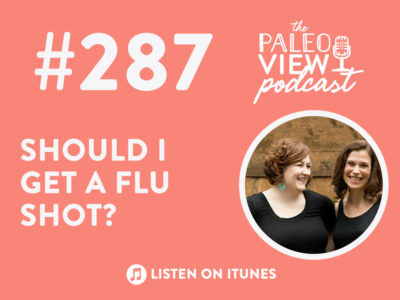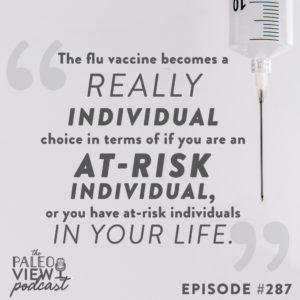In this episode, Stacy and Sarah answer a question from a healthcare professional about mandatory flu shots.
Table of Contents[Hide][Show]
Click here to listen in iTunes
or download and listen by clicking the PodBean Player below
![]()
If you enjoy the show, please review it in iTunes!
The Paleo View (TPV), Episode 287: Should I Get a Flu Shot?
- Intro (0:00)
- News and Views (0:40)
- Backstreet’s Back, and so are Sarah and Stacy!
- Reminiscing about the 90s, and Stacy breaking out into song- a rare treat!
- Stacy is working on The Body Love series.
- Her free ebook will be launching with this series – sign up to get it here.
- It encourages never dieting again, a sustainable lifestyle perspective.
- It’s about finding what works for you.
- Stacy hears feedback of people noting reduced illness and increased immune function with a healthy diet.
- This is an interesting metric of health.
- Stacy avoided the flu in multiple instances this year.
- Sarah woke up feeling the yuk one morning, took good care of herself and never got sick.
- As an adult its hard to take it easy and take care of yourself when you’re sick.
- Sarah has several friends who had complications from this year’s flu.
- Sarah is sick far less often that she was pre-Paleo.
- Stacy attributes “souping” to her staying health when exposed to illness.
- Stacy’s post on Souping here.
- Sarah’s post on Souping here.
- The nutrients in soup are quite different than other liquid-type diets like juicing.
- It’s a balanced meal with a lot of nutrient density.
- Soup is more efficiently digested and filling than things like smoothies or juice.
- Sometimes things like souping and vitamin C aren’t enough and medicine is needed.
- Listener Question – Science with Sarah (13:01)
- Kelly asks, “I work in skilled nursing as an occupational therapist. My company requires taking the flu vaccine or wearing a mask from November to February. I understand the company’s position looking at lost work time and revenue due to sick days. My direct supervisor says her reason for wanting all employees to take the vaccine is that if we don’t we are at an increased risk of passing the flu to our residents even if we don’t have the flu ourselves (she quotes a 30% increase). I have looked and cannot find studies to support this. I actually found from the Cochrane review and PubMed that no relation is found. I have opted not to vaccinate this year, I’m the only employee in my department to not vaccinate this season. I am wearing a mask daily and actually feel like it will decrease my risk of catching a cold. I was just wondering if there was any evidence that not taking the vaccine increases the risk for my residents. Last year I did take the vaccine in October and in January in a 2 week period was diagnosed with strep throat, sinus infection, bilateral eye, and bilateral ear infections. Was not tested for flu due to having had the vaccine.”
- Disclaimer: we realize that vaccination is a highly debated and hot topic, and all the information we are presenting is based in science. Please take this information and decide what is right for you, we are not medical professionals.
- References for this show can be found below.
- The flu vaccine is different than most other vaccines.
- With all vaccines, there is a very small risk of allergic reactions or adverse reactions.
- Aside from those reactions, vaccines are completely safe.
- Diseases like Polio, Measles, and Tetnis, which had a very high morbidity rate and were killing tens of thousands of people every year, is a different equation compared to the flu vaccine.
- The flu virus mutates rapidly, which means the vaccine isn’t as effective as other types of vaccines.
- The flu is very virulent- with around 3 million cases every year.
- The number of flu-related deaths every year differs quite a bit.
- It is not usually associated with intestinal symptoms, but rather fever, aches and pains, runny nose, sore throat, cough, and fatigue.
- Flu increases the risk of secondary infections, which is what usually causes death, not the flu itself.
- Flu is spread through respiratory secretions.
- Microscopic droplets of saliva are spread through coughing, even breathing.
- The flu vaccine is based off an educated guess every year.
- Based on data and modeling as to how it is going to mutate in the coming year.
- Vaccines contain inactivated or dead virus for typically 2-4 strains of flu.
- The immunity we get from flu vaccines in often very transient.
- Estimates are that immunity from the flu vaccine lasts about 6 months.
- This is why it is recommended to get one every year.
- Estimates are that immunity from the flu vaccine lasts about 6 months.
- When they guess well and the vaccine matches up with the actual dominant flu viruses for the year, the vaccine is at best 50-60% effective.
- This would decrease your chance of getting the flu by 50-60%.
- A study showed between 2010-2015 the average flu vaccine was 41% effective.
- During a bad guessing year, the vaccine was 14% effective.
- The Cochrane review that Kelly referenced was a 2010 meta-analysis of 50 different studies.
- It showed the absolute difference in the incidence of flu during a year when the vaccine was a good match was a 3% difference.
- Unvaccinated risk of getting the flu was 4%.
- Vaccinated risk of getting the flu was 1%.
- A recent paper updated those statistics and shows that on average your risk of getting the flu if you are unvaccinated is 2.3 %, compared to 0.9% if you are not. This is on a good match year.
- It showed the absolute difference in the incidence of flu during a year when the vaccine was a good match was a 3% difference.
- A rationale for getting the vaccine includes:
- You are less likely to get sick, even though the percentage seems small, it is significant.
- 2 out of 100 who would have gotten the flu, won’t if they are vaccinated.
- Risk of hospitalization showed 14.7% chance if unvaccinated, and 14.1% in the vaccinated population.
- The benefit was much higher in the elderly.
- The elderly (vaguely defined as those over 65) have less robust immune systems.
- This raises the question of if the elderly are actually developing immunity against the flu.
- Unvaccinated elderly have 6% chance of getting flu, compared to 2.4% in vaccinated.
- You are less likely to get sick, even though the percentage seems small, it is significant.
- The statistics regarding the flu will mean different things to different people.
- Some people will hear there is a 2% difference in chance and want to get the vaccine.
- Some people will hear there is a 2% difference and won’t want to bother.
- No matter how you develop immunity against the flu, whether you get the flu or the flu vaccine, it will still be incomplete immunity.
- This is because the flu virus mutates so quickly.
- There is always some cross-protection in both situations.
- The flu vaccine become a really individual choice in terms of if you are an at-risk individual or you have at-risk individuals in your life.
- Kelly mentioned that last year when she got the flu vaccine she got a lot of other infections.
- There have been robust studies that showed no difference in side effects after vaccination.
- Those who got the flu vaccine had more arm soreness and mild fever in a few days after.
- There was no difference in non-flu-related infections or symptoms.
- There is a perception that if we get sick after getting a vaccine, it was the vaccine that made us sick.
- This is unfortunate timing.
- You were likely exposed to something before you got the vaccine.
- Some illness can have incubation periods of two weeks or more.
- There have been robust studies that showed no difference in side effects after vaccination.
- Mandatory vaccines for healthcare professionals- part of Kelly’s questions.
- You are typically most contagious right before you develop symptoms.
- This is part of the reason why the flu can spread so quickly.
- We are out doing normal activities, not realizing we are sharing the virus with others.
- Even when symptoms just start, we often do our normal activities.
- This is part of the reason why the flu can spread so quickly.
- Kelly references the Cochrane paper, which was looking at whether or not health care workers getting vaccinated protected patients from the flu.
- It showed a lack of sufficient evidence to make claims.
- More recent evidence probably refutes this somewhat.
- Another study looked at flu season mortality in residents of chronic care institutions.
- There was a 10-20% decrease in mortality where staff vaccination rates were higher.
- Staff vaccination rates of 60-70% versus 20% showed up in the mortality of the patients.
- There was a 10-20% decrease in mortality where staff vaccination rates were higher.
- Healthy caregivers and an at-risk population give a sensitive statistical model.
- There is compelling evidence that health care workers getting vaccinated can protect patients in a hospital or residential care setting.
- This could be mostly related to herd immunity.
- The flu won’t spread as quickly when there are fewer hosts around to get it.
- Wearing a mask versus getting a vaccine as a health care provider.
- Best practices say to get as many staff vaccinated as possible.
- Recommendation #2 is to have people wear masks.
- Have hand sanitizer readily available and encourage hand washing.
- Kelly thinks wearing a mask will protect her from getting a cold.
- She is absolutely right- many illnesses are spread through respiratory secretions.
- This is a great way to protect yourself and those around you.
- Best practices say to get as many staff vaccinated as possible.
- You are typically most contagious right before you develop symptoms.
- There are valid arguments for the flu vaccine and not really many to be made against it.
- Vaccines are safe and the risks are low.
- Those with autoimmune disease don’t like to vaccines because the adjuvants can cause symptoms or a flare.
- This is often transient.
- This definitely changes the equations, as a flare is an awful thing to go through.
- We need a better way to vaccinate against the flu.
- This is the number one conclusion that can be drawn from looking at the research and statistics.
- There is a lot of information out there, and you should make the best decision for yourself.
- In regard to Kelly’s question whether or not her getting the vaccine can protect residents of the facility she works in, the science does say yes.
- Getting the flu itself can also trigger for an autoimmune flare.
- Stacy doesn’t consider herself in a high-risk category for getting the flu.
- Even though she does have kids, she doesn’t work in a medical setting, and she has the ability to take off work if she needs to should she become ill.
- She made the best choice for her.
- Other adults in her household have made other decisions regarding the flu vaccine.
- Know your body and what you are comfortable with – it’s your decision.
- She feels the Doterra OnGuard blend has helped her in avoiding the flu this year.
- We talked about essential oils in this podcast.
- Stacy used the hand sanitizer and diffused the blend in her office.
- She was one of only a few from her office to not get the flu this year.
- She is also supporting her immune system with diet and lifestyle.
- We all need to own that this is our choice and our body.
- Vaccination against illness other than the flu, such as Measles, Mumps, Diptheria is different than the flu.
- The mortality rate is higher, as is the effectiveness of the vaccines.
- This becomes a no-brainer to get those vaccines and contribute to herd immunity.
- We should be able to put more than just Small Pox into extinction.
- This is a different conversation than the flu vaccine one because the statistics aren’t as strong.
- The mortality rate is higher, as is the effectiveness of the vaccines.
- Stay well, everybody!
- If you have follow-up questions, reach out through the contact forms on our websites or social media.
- If you’ve enjoyed the show, please recommend it to someone who might enjoy it.
- We love when you share and when you leave reviews for us! Thanks for listening!
Citations:
Osterholm MT, Kelley NS, Sommer A, Belongia EA. Efficacy and effectiveness of influenza vaccines: a systematic review and meta-analysis. Lancet Infect Dis. 2012;12(1):36–44. Erratum in: Lancet Infect Dis. 2012;12(9):655.
van den Dool C, Bonten MJ, Hak E, Wallinga J. Modeling the effects of influenza vaccination of health care workers in hospital departments. Vaccine. 2009;27(44):6261–7.
Jefferson T, Di Pietrantonj C, Rivetti A, Bawazeer GA, Al-Ansary LA, Ferroni E. Vaccines for preventing influenza in healthy adults. Cochrane Database Syst Rev. 2010(7):CD001269.










